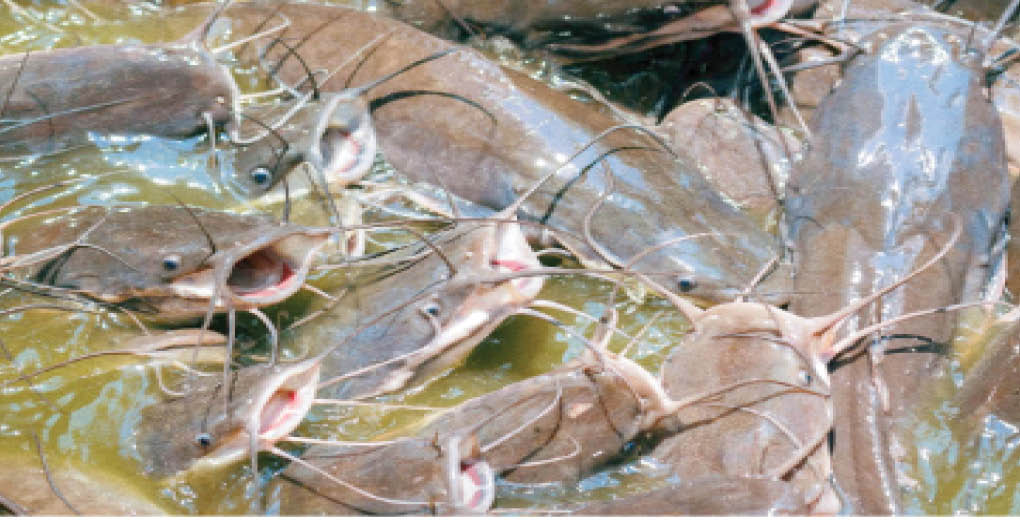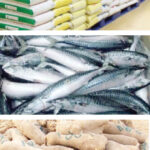Just like other forms of farming, aqua or fish farming urgently requires the attention of stakeholders to save it from total collapse.
Our agric editor who has been monitoring the sub-sector reports that the outbreak of the COVID-19 has further threatened fish farming activities across the country.
The fear in the sector now is that unless something urgent is done to salvage the situation, it will be difficult for the farmers to meet the huge local demand in the country.
According to WorldFish Nigeria Strategy 2018-2022, Nigeria produces one million metric tonnes of fish annually, leaving a deficit of about 800,000 metric tonnes; which is imported.
According to WorldFish Nigeria, fishery is a major economic sector, estimated to employ over 8.6 million people directly and a further 19.6 million indirectly; 70 per cent of whom are women.
However, stakeholders believe the sector is under great threat if the authority fails to take urgent action.
Challenges
A Lagos-based aquaculturist, Mr. Amah Eteobong, identified capital intensiveness, increasing fish feed cost and poor expertise as some of the challenges facing aqua farming in the country; even before the outbreak of COVID-19.
Mr. Eteobong, a marine farming entrepreneur, said the bottlenecks faced in the aquaculture system had hindered the growth of the sector in the country.
He said, “The challenges currently plaguing aquaculture farming in the country include set-up capital, cost of fish feed and poor expertise.
“Aquaculture is a capital-intensive venture; even if a farmer wants to start small, he is still going to put in a lot of money to start up a fish farm.
“One major challenge in going into aquaculture business is the bottlenecks we face when it comes to accessing grants and loans.
“For instance, before a farmer is able to set up a farm and raise 1,000 fishes comfortably, you need to have nothing less than N1m to N1.5m.
“The farmer needs to invest extensively on the fixed assets on the farm like ponds and boreholes, hence the cost-intensiveness to start up.”
The farmer also spoke on the increasing cost of fish feed which in turn does not allow local fish farmers to get returns on their investments.
According to him, 50 per cent of farmers’ expenses are allocated to procuring fish feed and the cost of fuel in running boreholes.
He said, “The problem is that the prices of fish feed keep increasing, but the price of cultured fish remains constant thereby, causing the farmers to run short.
“The cost of feed production is on the increase. Maize, soya beans, groundnut cake and fish meal have all increased.”
He further said lack of expertise in aquaculture was another major challenge and therefore called for more people to learn aquaculture farming.
He explained that, “We need people to be trained in aquaculture because climate change actually affects cultured fish. So fishermen are not catching enough fish from our seas or rivers, hence the fall back on cultured fish.
“We have a lot of novices in aquaculture today. Some people get into the business just because a motivational speaker said they could put a fish into a pond and harvest a river after five months.”
Therefore, the aquaculturist told the News Agency of Nigeria (NAN) in Lagos that, “People need to be trained in aquaculture farming because according to experts, in a few years, one-third of protein consumed by humans will be gotten from farmed fish.
Also, the National Fish Association of Nigeria (NFAN), at the weekend, called on the Federal Government to come to the aid of its members who were in distress due to losses incurred as a result of the COVID-19 pandemic.
NFAN said its members suffered huge losses during the first two months of the lockdown and were yet to recover from it.
The President of NFAN, Dr. Gabriel Ogunsanya, said the industry required strong government commitment, particularly in terms of policy direction and funding, for fish importation to be banned in 2022 as assured by the Federal Government.
Dr. Ogunsanya said, “As we carry on with the task to meet national fish demand threshold in two years, our farmers require palliatives and economic stimulus packages to remain in business as extended to others.
“We, therefore, pray the Federal Government to consider declaring a state of emergency and implementation of a structured plan to revamp the struggling fishery and aquaculture sub-sector.
“We also urge the Ministries of Agriculture and Rural Development and Industry, Trade and Investment to bring attention of government, MDAs and funding bodies to the plight of hard working fish farmers and industry operators.”
In a statement, the Publicity Secretary of NFAN, Mr. Chidike Ukoh, said, “We have serious concerns that in the midst of inadequate fish supply, production challenges and personal sacrifices, our farmers are currently facing unbelievable fish glut.
“They are equally facing abysmally low pricing and inability to harvest and evacuate ponds and other fish-holding water bodies.
“These challenges are, therefore, preventing restocking to break the production cycle.’’
What must be done
Mr. Toyin Afolabi, another marine farming entrepreneur, urged the government to develop and implement a strategic plan for the sector which would allow interested fish farmers to access soft bank loans.
Mr. Afolabi said, “Our extension service department should be strengthened so that more extension officers are recruited to train and guide intending fish farmers before venturing into the business. Effort should be made to encourage local production of maize, soya beans and other additives for the production of fish feeds, because as it is now, there is no way fish farmers can make it with the present high cost of feeds.”
Minister of Agriculture and Rural Development, Sabo Nanono, had said plans were underway to stop fish importation in 2022.
He said time had come for Nigeria to look inward to tap into the huge potentials in fisheries and aquaculture for local consumption and export.

 Join Daily Trust WhatsApp Community For Quick Access To News and Happenings Around You.
Join Daily Trust WhatsApp Community For Quick Access To News and Happenings Around You.


